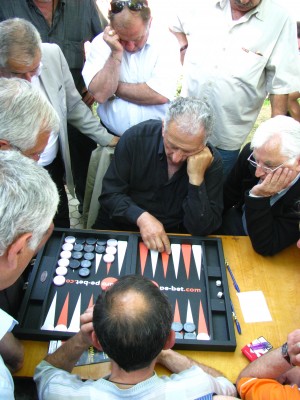
Everywhere I go, I see people playing ნარდი (“nardi”), known in English as backgammon. Men and women, children and the elderly–everyone knows how to play, and just about every family owns a backgammon set. It’s popular everywhere in Georgia, but it’s especially popular here in Kutaisi, where it’s not uncommon to see clusters of old men playing on the side of the street.
I recently played in a nardi tournament at my school. Long story short, I was massacred (I still want a rematch with the principal), but the experience got me thinking about how the game kind of parallels what life is like in Georgia. As a foreigner, I’m sure I don’t have a complete picture, but it’s an interesting way to look at things, and I don’t think it’s completely off base.
So anyways, here’s my theory on how life in Georgia is like a game of backgammon:
1: Everything is driven by chance.
In backgammon, every turn starts with a roll of the dice. Likewise, in Georgia, people tend to approach life like a game of chance. Good things happen, bad things happen, but you’re never totally in control of your own destiny. When your luck turns sour, the best thing you can do is just resign yourself to it until things get better.
One thing I’ve noticed about my host family is that they play the lottery almost every day. Even when they aren’t playing, they usually tune in to see the results, probably just from force of habit. I don’t know if every family is like this, but there are stands to buy lottery tickets in every major district of the city, and every kiosk sells them.
It’s not just the lottery, either–there are tons of casinos too. In fact, Georgia is a very popular tourist destination for Israelis simply because of all the gambling. That doesn’t mean that everyone in the country is a hardcore gambler, though–but if life is ultimately a game of chance, you might as well put a line or two in the water, right?
2: Skill is the ability to manipulate chance in your favor.
Even though backgammon is essentially a game of chance, there’s a lot of strategy to it too. The key is to maximize your own options while limiting the options of your opponent. It’s all about knowing when to move aggressively, and when to protect your own interests.
Likewise, even though Georgians put a lot of trust in luck, they also know that it’s better to make your own luck than to wait for luck to find you. While my host family does spend a little bit on the lottery, they spend a lot more on physical improvements and their kids’ education. My host dad works until 8pm every night, sometimes later. They aren’t rich, but they’re taking advantage of opportunities their parents didn’t have, and making sure their children have more opportunities than they did.
3: No amount of skill can change the established pattern.
There’s not a whole lot of variation in backgammon. Every game starts with the same setup, and follows the same general pattern: block your opponent while doing your best to advance. Once your last piece passes your opponent’s last piece, it becomes a race to see who can get all their pieces home first. Short of changing the rules, there’s really no way to break the game.
Likewise, life in Georgia is still very much about tradition. If you were born in Kutaisi, you’ll probably die in Kutaisi. If your parents are Orthodox, then that’s what you are, too. If you’re a woman, you live under a certain set of restrictions and expectations. Likewise, if you’re a man, there are certain things you’re expected to do to prove your manhood.
No matter how much Georgia changes to become part of the modern world, it’s an ancient country with a very, very long memory. Most social norms aren’t going to change overnight, and some of them probably won’t change at all. While this might seem incredibly stifling to us in the West, it does have its advantages, such as offering everyone a sense of identity and giving them a place where they know that they belong.
So that’s my theory. I don’t know if this is why backgammon resonates so much with the people here, but it’s a fun way to look at it. Now I just need to figure out which game is the most like life in the US. Poker? Monopoly? Dungeons & Dragons?

I used to play backgammon a lot, Joe. I liked it. I still have the game in the corner of my living room. In the 70’s in America i guess it was a really popular bar game–like pool is now.
A guy at work told me that the manliest thing he’d ever seen was a guy who lost around $400,000.00 in one roll of the dice at backgammon, who afterwards sat down at a booth, ordered a steak dinner, ate the entire meal, and then left.
Considering my luck, I don’t think I’d survive in a culture where luck plays such a big role. (or should that be “roll)?
In Georgia are women off-limits from playing Nardi in public? If we ever wanted to shock people or make young men stop following us, we’d go up to a bunch of old guys playing Nardi on the street and demand a match. They always thought this was both horribly shocking and the best entertainment of their lives.
That’s a pretty cool story, Steve. Unless that steak dinner was the man’s last meal.
As for women and nardi, I’ve seen them playing in tournaments–for example, at school and at the big Kutaisoba festival last week. But generally, when the men get together for a birja (basically, hanging out on the street), it’s a no-girls-allowed kind of thing.
The one time I’ve seen a woman “play” in public was when we sat down for a game and we were playing against her husband and she wanted us to win so she stood next to us and gave us hints. So I’m glad to hear that you’ve seen them actually play–and far more often.
In Armenia at least, a vast majority of men don’t touch any part of housework, so as soon as they retire, they basically retire to playing nardi. And since you can’t retire from housekeeping, well, no games for you. It seemed to be a self-fulfilling cycle of the women never stopping to relax or play and the men always playing. So I was really glad when she put down her work and came outside to help us beat her husband. 🙂 *amused*